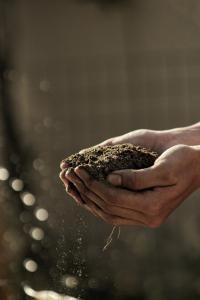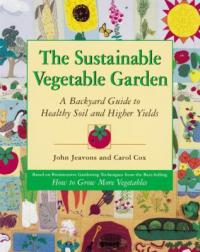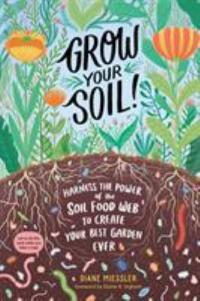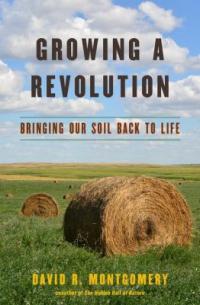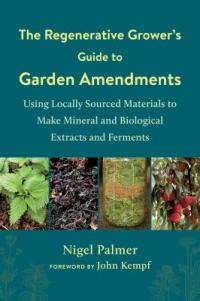Soil, that stuff in the ground. More and more, growers are understanding that healthy soils lead to healthier crops. Just like how we can’t live without water, air, or food, the same is true for soil! Without basic necessities, soil is deprived of the nutrients it needs to be a healthy ecosystem and it will end up producing mediocre crops. But when there’s a thriving soil ecosystem, the soil manages itself and requires little, if any, help from fertilizers, amendments, tilling, etc. When the soil is healthy, it will sustain life and grow the things you ask it to!
Healthy soil is home to lots of bacteria, fungi, algae, protozoa, nematodes, and other tiny creatures. Those organisms play an important role in plant health, and we should embrace them and their roles in the soil’s ecosystem. Soil bacteria produce natural antibiotics that help plants resist disease and fungi help plants absorb water and nutrients. Together, they are known as “organic matter.” In general, the more organic matter, the healthier the soil will be.
Ideally, we would like to see soil that allows plants to grow to their maximum productivity without disease or pests and without a need for supplements or amendments. Sometimes, however, we need to help our soil along the way.
One way to maintain your soil health is to avoid the use of pesticides, except when necessary. Pesticides may kill earthworms and microorganisms in the soil along with the disease-causing organisms. Instead of routinely using pesticides, use one only when a problem arises and only after natural treatments have been considered. Treat problem spots, if possible, rather than treating the entire garden.
Knowing your soil’s structure will help you understand how your plants will grow. There are three basic types of soil: sand, silt, and clay. Most plants grow best in soils with a pH of 5-6.5. In Colorado, a lot of soil tends toward the alkaline side, between 7.0 and 7.8 or above. We also tend to have heavy clay soil, which makes it difficult for air and water to move through the solid matter in the soil. There are tests you can use at home to discover how acidic or alkaline your particular soil is, or you can have one done by the CSU Master Gardeners. The CSU test will give you a detailed analysis as well as suggestions for how to improve your soil.
Another benefit of knowing your soil type and pH is that it will allow you to choose the fertilizers and amendments that will be most beneficial to your garden. Fertilizers have an N-P-K ratio (nitrogen, phosphorus, potassium) that will complement your soil’s current state. Nitrogen is good for green leaves, phosphorus for roots and energy, and potassium for proteins and disease resistance. If a fourth number is listed, it will be the percentage of “S”, for sulfur, but adding sulfur is not usually recommended. Organic fertilizers can be very beneficial IF your soil needs it!
You’ll want to avoid unnecessary roto-tilling too, because it destroys beneficial fungi and soil structures. Instead, try using a broadfork (I find dancing on a broadfork in the field to be very entertaining!) and only dig where you plant. For larger spaces, adopting a “no-till” mindset will benefit your soil over time. It seems counterproductive, but every time you till, you upset the balance of nitrogen and carbon that your soil has naturally been trying to amend on its own.
For weed control try using straw, grass clippings, or shredded bark as mulch. Mulching will keep your soil nice and moist--something to think about in the dry Colorado climate! Some people prefer to use landscape fabric or plastic, which can indeed help with weeds, but be mindful that it doesn’t starve your soil of oxygen. For inexpensive alternatives, try newspaper or cardboard covered with whatever mulch materials you have available! And though it’s tricky sometimes, avoid stepping on your garden (especially when the soil is wet) because it will compact the soil and prevent oxygen and water from reaching underneath.
Compost is a very effective way of adding organic material to your garden. Compost is regenerative! It attracts earthworms (who give nutrients that plants love through their digestion) and other beneficial organisms, and it also provides nutrients to your crops while improving soil. Try using these compost items: coffee grounds, chopped leaves and grass clippings, eggshells, fruit and vegetable scraps, and paper towels. And while we don’t have time to delve into it this round, you can try compost tea too! Pro tip: don’t use meat, weeds, or diseased plants for compost. Trust me on this one!
Overall, we want to aim for balance. There is such a thing as adding too many amendments, which can cause your soil to spiral out of balance, and lead you down a path of constantly trying to “fix” the issue. There’s so much to learn about soil health that it can sometimes feel daunting, so don’t worry if you’re new to this and feel overwhelmed. Soil health is a long-term game, so don’t feel bad if you aren’t seeing the results you hoped for right away. If your soil looks or feels unhealthy from the get-go, look into testing your soil. That way, you’ll know exactly what it needs to make your plants happy and healthy.
We have many resources to help you along your gardening journey. Listed below are just a few to start with. We also invite you to attend one of our fantastic gardening programs, led by a CSU Master Gardener!
And lastly, the Park Hill Branch Library, Ross-Broadway Branch Library, and Central Library are offering seed bundles for the first time ever this spring! Fill out this form to request up to 3 bundles per patron. You will receive an email letting you know when your bundle is ready. This service will be offered while supplies last.
We’d love to join you on your seed journey: post your garden progress on social media with the hashtag #growwithDPL—we can’t wait to see what you grow!
To help us make services like this available in the future, consider saving seeds from your crops and donating them back to the library in the fall. If you’re not sure where to start with saving seeds, we can help you! Please reach out to us if you have any questions at seeds@denverlibrary.org.
Resources:
The Sustainable Vegetable Garden: a Backyard Guide to Healthy Soil and Higher Yields by John Jeavons
Grow Your Soil!: Harness the Power of the Soil Food Web to Create Your Best Garden Ever by Diane Miessler
Growing a Revolution: Bringing Our Soil Back to Life by David R. Montgomery
The Regenerative Grower's Guide to Garden Amendments: Using Locally Sourced Materials to Make Mineral and Biological Extracts and Ferments by Nigel Palmer
The Science of Gardening - The Great Courses - Kanopy (check out episodes 3, 4, and 8 for soil-specific learning)
